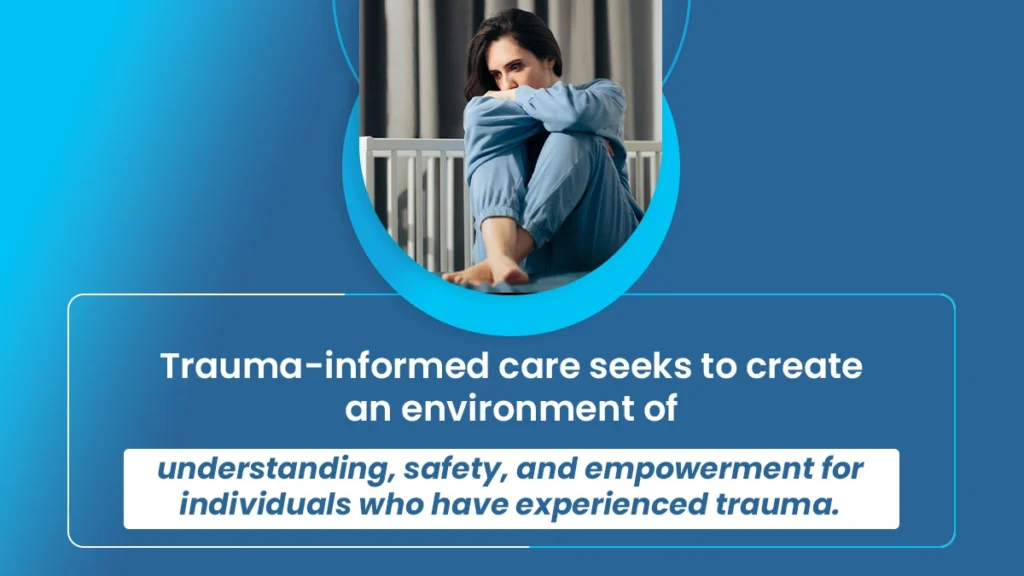Trauma-informed care (TIC) is a compassionate approach to providing support and services to individuals who have experienced trauma. This approach seeks to empower and validate survivors, recognizing that their past experiences may influence their present behavior and responses.

By fostering a sensitive and understanding environment, TIC aims to avoid traumatization and create spaces where healing and resilience can thrive.
Key Takeaways
Recognizing the signs of trauma and implementing appropriate interventions can break the cycle of re-traumatization and support long-term recovery and well-being.
- Trauma-informed care seeks to create an environment of understanding, safety, and empowerment for individuals who have experienced trauma.
- It prioritizes sensitivity and responsiveness to the unique needs of trauma survivors, focusing on promoting healing and resilience rather than traumatization.
- Fundamental principles of trauma-informed care are cultural competence, empowerment, and avoiding judgment.
Contact The Haven Detox-South Florida at (561) 328-8627 for personalized treatment services for long-term recovery and growth.
Prevalence of Trauma
Trauma refers to an overwhelming and distressing event or series of events that surpass an individual’s ability to cope, often resulting in feelings of helplessness, fear, or horror. Trauma can be caused by various events, including war, natural disasters, accidents, emotional abuse, sexual violence, or witnessing distressing situations. The prevalence of trauma is startling, with a significant portion of the population having experienced at least one traumatic event in their lifetime.
The impact of trauma can be far-reaching and deeply ingrained, affecting an individual’s mental, emotional, and physical well-being.
Long-Term Effects of Trauma
The long-term effects of trauma can be complex and far-reaching, impacting various aspects of an individual’s physical, emotional, and psychological well-being.
Here are some common long-term effects of trauma:
- Post-Traumatic Stress Disorder (PTSD): One of the most well-known consequences of trauma, PTSD can develop after experiencing or witnessing a traumatic event. Symptoms may include intrusive memories, nightmares, flashbacks, hypervigilance, and avoidance of reminders related to the trauma.
- Anxiety and Panic Disorders: Trauma survivors may experience heightened anxiety, toxic stress, panic attacks, and generalized anxiety disorders due to the traumatic experience.
- Depression: Trauma can lead to hopelessness, persistent sadness, and a loss of interest in activities that were once enjoyed.
- Dissociation: Some trauma victims may experience dissociation, feeling disconnected from reality or themselves as a coping mechanism to escape overwhelming emotions or memories.
- Substance Abuse: In an attempt to numb emotional pain or cope with trauma-related symptoms, some people may turn to substance abuse or develop addictions.
- Physical Health Issues: Chronic trauma can have physical consequences, including headaches, digestive problems, chronic pain, and compromised immune function.
- Interpersonal Difficulties: Trauma can affect an individual’s ability to trust and form healthy relationships with others. It may lead to emotional detachment, difficulty expressing emotions, and difficulty maintaining close connections.
- Self-Esteem and Self-Worth: Trauma can significantly impact an individual’s sense of self-worth and self-esteem, leading to guilt, shame, or worthlessness.
- Cognitive Impairments: Trauma may affect concentration, memory, and the ability to process information effectively.
- Emotional Regulation: Survivors of trauma may struggle with regulating their emotions, leading to heightened reactivity or emotional numbness.
- Sleep Disturbances: Trauma can disrupt sleep patterns, leading to insomnia, nightmares, or night terrors.
- Avoidance Behaviors: Some individuals may avoid situations or triggers associated with the trauma, limiting their ability to engage in life fully.
Key Principles of Trauma-Informed Care
Trauma-informed care (TIC) recognizes and responds to the impact of trauma on individuals’ lives. It involves creating a safe and compassionate environment for individuals who have experienced trauma, fostering their healing and empowerment.
The following are fundamental principles of trauma-informed care:
Safety
Safety is the foundational principle of trauma-informed care. It entails establishing physical, emotional, and psychological safety for individuals accessing care. Understanding that trauma can leave survivors feeling vulnerable and threatened, TIC ensures that the care environment is predictable and stable.
This includes implementing protocols to avoid re-traumatization and providing a safe space for open communication and expression.
Trustworthiness
Building trust is crucial when working with individuals who have experienced trauma. The trauma-informed approach emphasizes honesty, reliability, and consistency in patient and client interactions. Practitioners and service providers aim to be transparent about processes and boundaries while fostering respect and empathy.
Trust forms the cornerstone of the therapeutic relationship, promoting healing and resilience.
Support
Trauma survivors often carry a heavy emotional burden, and the principle of support focuses on providing compassionate assistance. TIC acknowledges the impact of trauma on emotional well-being and offers appropriate emotional, psychological, and practical support.
This can involve trauma-specific interventions, access to counseling, peer support groups, and other resources that help children, friends, and families cope and recover.
Collaboration
Collaboration involves recognizing that survivors are experts in their experiences and must actively participate in their healing journey. TIC practitioners collaborate with individuals to develop personalized care plans that fulfill their unique needs and preferences.
It may also involve interprofessional collaboration to ensure comprehensive and holistic support.
Empowerment
Empowerment is at the heart of trauma-informed care, aiming to restore the agency and autonomy that trauma may have eroded. TIC fosters a strengths-based approach, focusing on the individual’s resilience and abilities rather than their vulnerabilities.
By empowering individuals to make choices and decisions about their care, TIC promotes a sense of control, which is vital for healing and recovery.
Intersectional
Trauma-informed care recognizes that trauma does not occur in isolation and that various intersecting identities and social factors influence an individual’s experiences. These can include race, gender, sexuality, disability, socioeconomic status, and more.
The intersectional approach ensures that care is sensitive to these diverse aspects of an individual’s life, avoiding one-size-fits-all approaches. It involves understanding and addressing systemic inequities that may exacerbate trauma and working to create inclusive and culturally competent care.
Treating Addiction After Trauma
Addiction is a complex and challenging condition, and when it co-occurs with trauma, the path to recovery becomes even more intricate. Traumatic experiences can significantly impact an individual’s mental and emotional well-being, leading to a higher risk of substance abuse as a way to cope with distressing emotions.
Specialized treatment approaches are required to address the intertwined addiction and trauma issues.
Let’s take a closer look at effective methods for treating addiction after trauma:
Dual Diagnosis Treatment
Dual diagnosis treatment is an integrated approach that acknowledges the coexistence of addiction and mental health disorders, including trauma-related disorders like PTSD (Post-Traumatic Stress Disorder). It recognizes that these conditions often exacerbate each other, making it crucial to treat both simultaneously.
In this approach, a team of professionals, including therapists, psychiatrists, and counselors, collaborates to develop personalized treatment plans that cater to the specific needs of the individual. By concurrently addressing the underlying trauma and addiction, patients have a better chance of achieving long-lasting recovery.
Medication-Assisted Detox
Detoxification is often the first step toward recovery for individuals with severe addiction. However, abruptly stopping substance use can lead to intense withdrawal symptoms, making it challenging to stay on the path to recovery.
Medication-assisted detox utilizes FDA-approved medications to help ease withdrawal symptoms and reduce cravings, making the detox process safer and more manageable. This approach is particularly useful for trauma survivors, who may have heightened sensitivities and stress responses during detoxification.
Inpatient Treatment
Inpatient or residential treatment offers comprehensive and intensive addiction and mental health services. In this setting, individuals live on-site at a treatment facility, receiving around-the-clock care and support from staff.
Inpatient treatment allows for immersive therapy, structured routines, and a safe environment that minimizes external triggers. Moreover, it enables trauma survivors to focus solely on their recovery without the distractions of daily life.
Close supervision and therapeutic interventions in inpatient treatment can significantly increase the chances of successful recovery.
Cognitive-Behavioral Therapy
Cognitive-behavioral therapy (CBT) is a widely recognized therapeutic approach for treating addiction and trauma-related disorders. It helps individuals identify negative thought patterns and behaviors contributing to substance abuse and trauma-related distress.
By working with a trained therapist, patients can develop healthier coping mechanisms and address the root causes of their addiction. CBT aims to improve emotional regulation and reduce triggers, providing trauma survivors with tools to navigate the challenges they face on their recovery journey.
Support Groups
Support groups play a significant role in the treatment of addiction after trauma. These groups provide a safe and non-judgmental space for individuals to share their experiences, learn from others, and gain valuable insights into their recovery.
Trauma survivors can connect with peers who have undergone similar experiences, fostering understanding and camaraderie. Support groups can be an essential source of encouragement and motivation during difficult times, making it easier for individuals to stay committed to their recovery goals.
Frequently Asked Questions (FAQ)
What exactly is “trauma-informed care,” and why is it important?
Trauma-informed practice is an approach that recognizes and responds to the impact of trauma on an individual’s well-being. It emphasizes safety, trust, and collaboration to avoid re-traumatization. It is important as it helps create a supportive environment for individuals who have experienced trauma, promoting healing and resilience while reducing potential harm from insensitive practices.
What are examples of trauma-informed care?
Trauma-informed care creates a safe and empowering environment. This is done by practicing active listening, recognizing trauma triggers, using non-traumatizing language, providing choices, and respecting boundaries.
It involves fostering a collaborative and compassionate medical care approach to help individuals cope with trauma’s effects.
What are the 4 components of trauma-informed care?
The four components of trauma-informed care are:
Realizing the prevalence and impact of trauma.
Recognizing the signs and symptoms of trauma in individuals.
Responding with empathy, understanding, and sensitivity.
Resisting traumatization and promoting empowerment through a safe and supportive environment.
These four elements are instrumental in helping patients heal from their trauma.
Find Transformative Recovery at The Haven Detox-South Florida
If you or a loved one has become dependent on alcohol and drugs while seeking solace from trauma, stress, or negative emotions, our team is here to provide the support and care you need to embark on a journey to recovery.
Our expert team provides compassionate care and evidence-based treatments to address the root causes of your addiction. Our specialized substance abuse services encompass detox and residential treatment, providing a safe and supportive environment for your healing.
Furthermore, our SMART Recovery approach empowers you with effective tools and strategies for lasting sobriety. Take the first step toward hope, strength, and renewal. Call us at (561) 328-8627 today.






